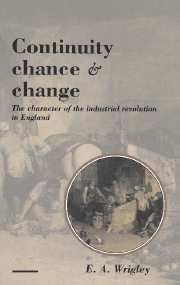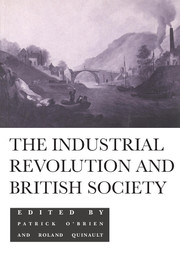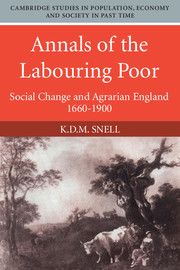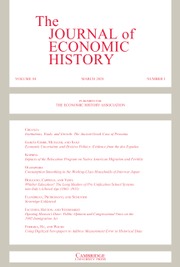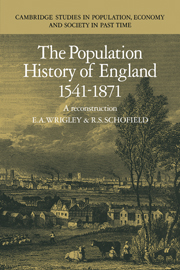Continuity, Chance and Change
The Character of the Industrial Revolution in England
$51.99 (P)
- Author: E. A. Wrigley, All Souls College, Oxford
- Date Published: November 1990
- availability: Available
- format: Paperback
- isbn: 9780521396578
$
51.99
(P)
Paperback
Looking for an examination copy?
This title is not currently available for examination. However, if you are interested in the title for your course we can consider offering an examination copy. To register your interest please contact [email protected] providing details of the course you are teaching.
-
The Industrial Revolution produced the modern world, a world of increased affluence, longevity, urbanization, and travel. This book illuminates how the great surge of economic growth that determined these changes was not expected, and often went unnoticed. The author begins by discussing the kind of substantial economic growth that was predicted at the time, and goes on to cover the growth that was unexpected. The link between these two types of growth is presented in the context of English economic growth between the sixteenth and nineteenth centuries and leads the author to challenge convincingly the conventional view that the Industrial Revolution was a simple, unitary, and consciously progressive phenomenon. .E.A. Wrigley is Senior Research Fellow, All Souls College, Oxford University. He is the author of several books, among them, Population and History (McGraw-Hill) The Population History of England (CUP) and Continuity, Chance and Change (CUP).
Read more- Wonderful reviews
- The author is considered to be one of the most influential scholars working in the field
- Provides a completely new perspective on the effects of the Industrial Revolution
Reviews & endorsements
"Wrigley's scheme has much to recommend it...It brings some enormously important and largely neglected aspects of the industrial revolution into the open, and creates a new and fruitful dimension to it by emphasizing phased growth and the element of chance in the presence of resources. It helps also to explain the fears felt towards it by contemporaries and the difficulties of imitating it elsewhere. It will stimulate renewed interest in the industrial revolution. In addition to which it is elegantly written and mercifully limited in length. Who could ask for more?" Sidney Pollard, Economic History Review
See more reviews"General history is often interesting, but rarely important and searching. Continuity, Chance and Change succeeds on all three counts." Julian Hoppit, Times Higher Education Supplement
"...required reading for all interested in the Industrial Revolution, for its key points are made with precision and pungency. The contrasting shapes for the preindustrial and industrial economies emerge with exceptional clarity in Wrigley's hands." Jack A. Goldstone, Journal of Economic History
"This is a short book, offering more argument than proof. But it goes a long way toward reviving and redefining the notion of the industrial revolution. Wrigley shows conclusively that the industrial revolution was not `a unitary, progressive, integrated phenomenon' (p. 132). And that is a worthwhile lesson for historians of science and technology, for by revealing some of the complexities of the social and economic changes of the industrial revolution, he reminds us that the science and technology of the day was not a unitary, progressive, or integrated phenomenon either. Wrigley provides the economic, demographic, and social framework within which it can be examined." Steven Lubar
"This short, thought-provoking essay is necessary reading for anyone concerned with the origins of the industrial revolution." Peter J. Hugill, Texas A & M University, in the Journal of Geography
"As one would expect, this is a richly thoughtful book which every serious student of modern British economic history should read and ponder." Jacob M. Price, Albion
"...this important and stimulating reinterpretation of some central issues in the industrial revolution should become required reading in the field." Donald A. Bailey, Urban History Review
Customer reviews
Not yet reviewed
Be the first to review
Review was not posted due to profanity
×Product details
- Date Published: November 1990
- format: Paperback
- isbn: 9780521396578
- length: 156 pages
- dimensions: 216 x 139 x 10 mm
- weight: 0.19kg
- contains: 3 b/w illus. 5 tables
- availability: Available
Table of Contents
List of figures and tables
Introduction
1. Definitions and concepts
2. The advanced organised economy
3. The mineral-based energy economy
4. Numbers and notions
References
Index.
Sorry, this resource is locked
Please register or sign in to request access. If you are having problems accessing these resources please email [email protected]
Register Sign in» Proceed
You are now leaving the Cambridge University Press website. Your eBook purchase and download will be completed by our partner www.ebooks.com. Please see the permission section of the www.ebooks.com catalogue page for details of the print & copy limits on our eBooks.
Continue ×Are you sure you want to delete your account?
This cannot be undone.
Thank you for your feedback which will help us improve our service.
If you requested a response, we will make sure to get back to you shortly.
×
